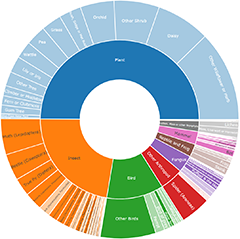Places
New South Wales
Woollamia, NSW
Woollamia, NSW
Announcements
16 Mar 2025
Hello NatureMaprs!Three new priority species lists of exotic freshwater and terrestrial invertebrates, and vertebrates in the ACT have been added to NatureMapr. Uploading records of these species to N...
Continue reading
NatureMapr now receives more records in NSW than ACT
NatureMapr Data Collector 6.2.1 update
Critical nature positive infrastructure update
IMPORTANT NatureMapr Data Collector 6.2.0 mobile app update
Discussion
JasonPStewartNMsnc2016
wrote:
27 Sep 2024
An important approach (in my 35 years professional field botanist experience)
is to go all out to sight all the spp. in a genus and botanical family in your focus region .
In my last 12 years in this wet tropics region (NE. Qld) i have successively focussed on different large botanical plants' families in different periods of years and seasons,
and learned every spp. i can in each of these family;
for some examples' families of many spp. out of many more families here:
Sapindaceae, Annonaceae, Myrtaceae, Lauraceae in part only still (so hard here), Proteaceae, Moraceae (figs), etc. .
The same systematic learning approach then mentored by late Jim Willis, late Don Neale, David Cameron, a bit GWCarr, David Albrecht and so on,
i did in the 1980s and 1990s in learning the entire Sand–stone–belt SE Melb. flora there in my late teenage of the late 1980s and first 10 years professionally throighout the 1990s.
is to go all out to sight all the spp. in a genus and botanical family in your focus region .
In my last 12 years in this wet tropics region (NE. Qld) i have successively focussed on different large botanical plants' families in different periods of years and seasons,
and learned every spp. i can in each of these family;
for some examples' families of many spp. out of many more families here:
Sapindaceae, Annonaceae, Myrtaceae, Lauraceae in part only still (so hard here), Proteaceae, Moraceae (figs), etc. .
The same systematic learning approach then mentored by late Jim Willis, late Don Neale, David Cameron, a bit GWCarr, David Albrecht and so on,
i did in the 1980s and 1990s in learning the entire Sand–stone–belt SE Melb. flora there in my late teenage of the late 1980s and first 10 years professionally throighout the 1990s.
Poranthera ericifolia
JasonPStewartNMsnc2016
wrote:
27 Sep 2024
I encourage you – continuing learning well.
In the field these diverse many spp. are not all easy to recognise.
I have to remind everybody that the most experienced botanists including professional field botanists have excellence in skills for identifying plants and occasionally make mis-identifications
(I have documented evidences of top botanists mistakes i have assisted them with and they have assisted me much more than again than I them);
and in scientific reality have no authority status – the science philosophy fallacy named argumentum ad auctoritate – as we all have humanity (we hope! :) )
In the field these diverse many spp. are not all easy to recognise.
I have to remind everybody that the most experienced botanists including professional field botanists have excellence in skills for identifying plants and occasionally make mis-identifications
(I have documented evidences of top botanists mistakes i have assisted them with and they have assisted me much more than again than I them);
and in scientific reality have no authority status – the science philosophy fallacy named argumentum ad auctoritate – as we all have humanity (we hope! :) )
Poranthera ericifolia
lbradley
wrote:
27 Sep 2024
Ciaran confirmed this one.
It’s frustrating that I’m not doing better with my identifications.
It’s frustrating that I’m not doing better with my identifications.
Poranthera ericifolia
JasonPStewartNMsnc2016
wrote:
27 Sep 2024
@lbradley I'm happily patiently waiting for hearing from you, before confirmation .
Poranthera ericifolia
JasonPStewartNMsnc2016
wrote:
26 Sep 2024
In your second photograph when looking at full resolution i can view the laciniate (±) stipules.
Enough for confirmation of *Poranthera ericoides* species identification for me.
Enough for confirmation of *Poranthera ericoides* species identification for me.
Poranthera ericifolia
Top contributors
- lbradley 14
- christinemrigg 5
- AniseStar 4
- plants 3
- MB 2
- SimonDunstan 0
- Tapirlord 0
- MichaelMulvaney 0
- JasonPStewartNMsnc2016 0
Top moderators
- plants 12
- JasonPStewartNMsnc2016 4
- Tapirlord 2
- MichaelMulvaney 1
- SimonDunstan 1
- christinemrigg 0
- MB 0
- lbradley 0
- AniseStar 0



